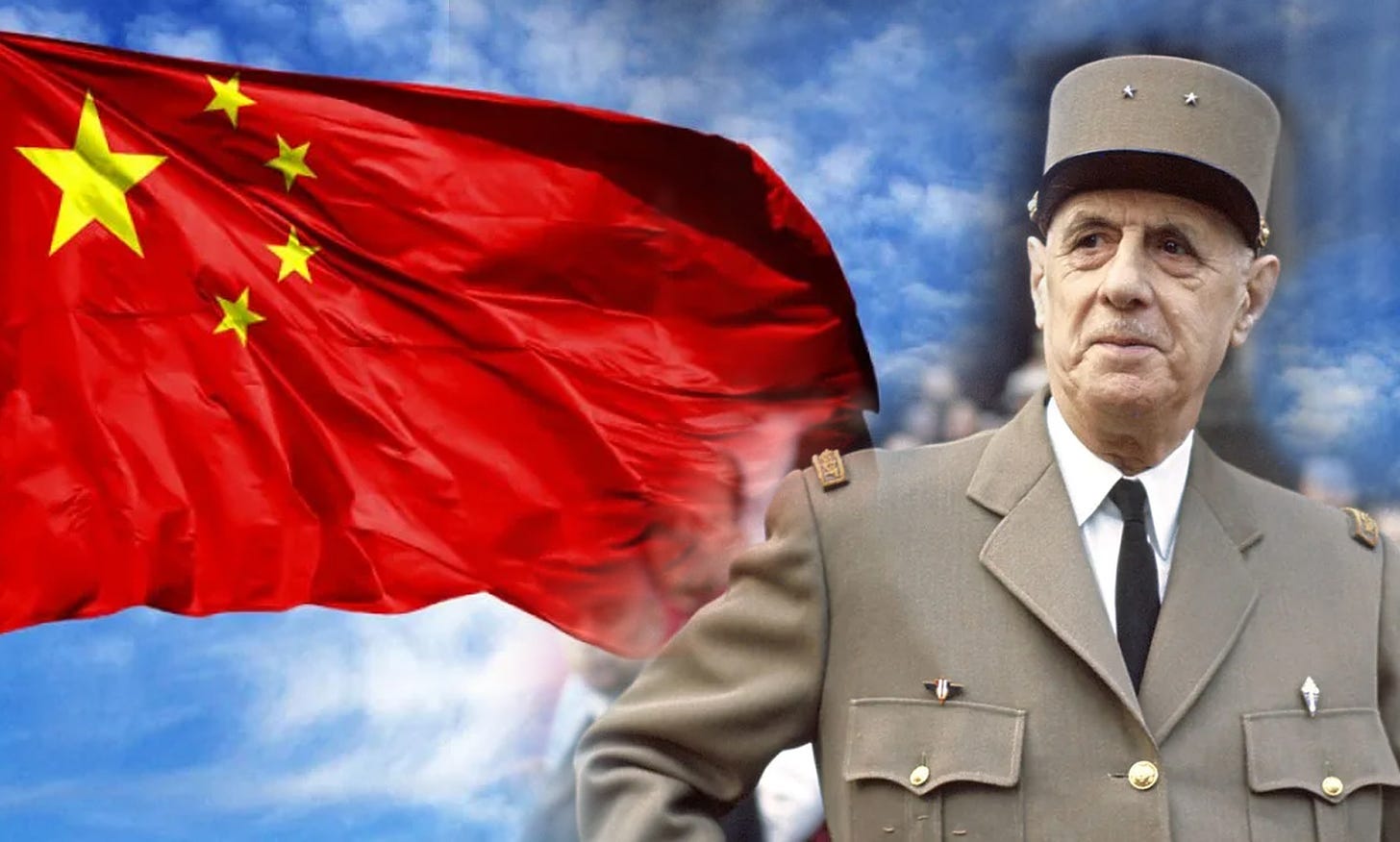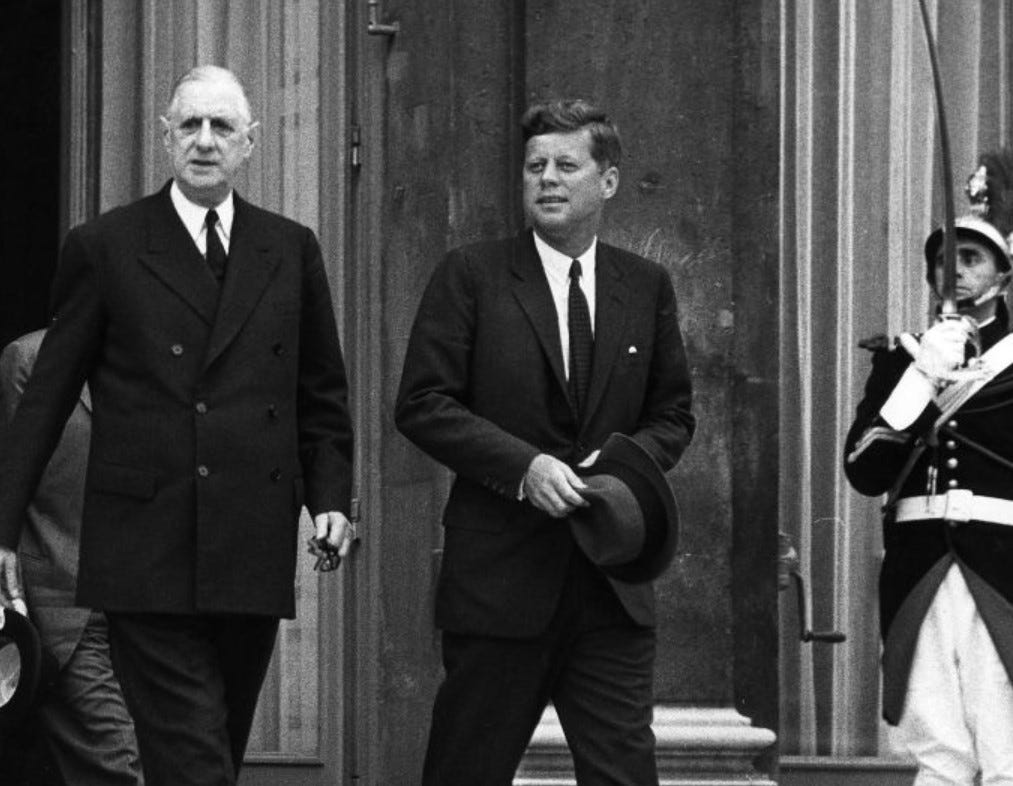On January 27, my good friend Jeff J. Brown made a short video celebrating the 60th anniversary of President Charles de Gaulle’s recognition of China (which occured on Jan. 27, 1964) opening the door to a strategy of pro-industrial cooperation between east and west. Jeff Brown’s Substack video commemorating that event can be watched here.
Since President de Gaulle’s grand vision for a world liberated from systems of oligarchism, bankers’ dictatorships and empire has been obscured from modern memory, I thought it worthwhile to add a few thoughts to this auspicious anniversary- with the hope and prayers that the spirit of the anti-Malthusian intelligentsia of France, once led by the great de Gaulle might once again revive this spirit of cooperation and progress.
What did Charles de Gaulle Represent?
Charles de Gaulle was among a network of leaders who fought valiantly against the cancerous deep state that had formerly supported fascism in WWII. While Franklin Roosevelt had to do battle with such pro-fascist organizations such as the JP Morgan-funded Liberty League and Council on Foreign Relations from 1933-1945, President De Gaulle had to contend with the pro-Nazi Petain government whose agents immediately took over controls of France in the wake of WWII, and didn’t go away upon the General’s ascension to the Presidency during the near collapse of the 5th republic in 1959.
De Gaulle strategically fought tooth and nail against the pro-NATO fascists led by General Challe who attempted two coup attempts against De Gaulle in 1960 and 1961 and later worked with MI6 and the CIA using private contractors like Permindex to arrange over 30 assassination attempts from 1961-1969.
De Gaulle was not only successful at taking France out of the NATO cage in 1966, but he had organized to ensure Algeria’s independence against the will of the entire deep state of France who often worked with Dulles’ State Department to preserve France’s colonial possessions.
Cynthia Chung writes of this dense period saying:
“In August 1962 the OAS (Secret Army Organization) made an assassination attempt against de Gaulle, believing he had betrayed France by giving up Algeria to Algerian nationalists. This would be the most notorious assassination attempt on de Gaulle (who would remarkably survive over thirty assassination attempts while President of France) when a dozen OAS snipers opened fire on the president’s car, which managed to escape the ambush despite all four tires being shot out.
After the failed coup d’état, de Gaulle launched a purge of his security forces and ousted General Paul Grossin, the chief of SDECE (the French secret service). Grossin was closely aligned with the CIA, and had told Frank Wisner over lunch that the return of de Gaulle to power was equivalent to the Communists taking over in Paris”.
De Gaulle also recognized the importance of breaking the bipolar rules of the Cold War by reaching out to Russia calling for a renewed Europe “from the Atlantic to the Urals” and also an alliance with China with the intent of resolving the fires lit by western arsonists in Cambodia, Laos and Vietnam whose independence he was committed to guaranteeing. De Gaulle wrote of his plan in his Memoires:
“My aim, then, was to disengage France, not from the Atlantic Alliance, which I intended to maintain by way of ultimate precaution, but from the integration carried out by NATO under American command; to establish relations with each of the states of the East bloc, first and foremost Russia, with the object of bringing about a détente, followed by understanding and cooperation; to do likewise, when the time was ripe, with China”
After arranging a treaty with China’s Prime Minister Zhou Enlai, India’s Prime Minster Nehru and the leadership of Cambodia in 1963 to create a China-led block to resolve the crisis in Southeast Asia with France’s help, De Gaulle became the first western head of state to recognize China and establish diplomatic relations with the Mainland on January 31, 1964.
He saw that China’s growth would become a driving force of world development and saw a friendship based on scientific and technological progress to be a source of France’s renewal. Attacking the false dichotomy of “Free liberal capitalism” vs “totalitarian communism”, De Gaulle expressed the Colbertist traditions of “dirigisme” which have historically driven France’s progress since the 17th century when he said “We are not going to commit ourselves to the empire of liberal capitalism, and nobody can believe that we are ever going to submit to the crushing totalitarianism of communism.”
The De Gaulle-Kennedy Alliance
De Gaulle had great hopes to find like-minded anti-colonialist leaders and collaborators who were fighting against the deep state in other countries. In America he was inspired by the fresh leadership of the young John F. Kennedy whom he first met in Paris in May 1961. Of Kennedy, he wrote “The new President was determined to devote himself to the cause of freedom, justice, and progress. It is true that, persuaded that it was the duty of the United States and himself to redress wrongs, he would be drawn into ill-advised interventions. But the experience of the statesman would no doubt have gradually restrained the impulsiveness of the idealist. John Kennedy had the ability, and had it not been for the crime which killed him, might have had the time to leave his mark on our age.”
De Gaulle’s advice to Kennedy was instrumental in the young President’s decision to stay out of a land war in Vietnam and led to Kennedy’s National Security Action Memorandum 263 to begin a phase out of American military from Vietnam on October 2, 1963. Kenney and De Gaulle both shared the view (alongside Italian industrialist Enrico Mattei with whom both collaborated) that Africa, Asia and South America needed advanced scientific and technological progress, energy sovereignty and sanitation in order to be fully liberated by the colonial structures of Europe. All three fought openly for this vision and all three fell in the line of battle (one to a plane crash in 1961, another to several shooters in Dallas in 1963 and the last to a staged “colour revolution” in 1969.) [1]
If De Gaulle, Kennedy and Mattei were alive today, it is guaranteed they would recognize in the Belt and Road Initiative and broader Eurasian alliance, the only viable pathway to a future worth living in and the only means to save the souls of their own nations. The question is: Does France have enough patriotic memory to rekindle this tradition in order to break free of the depopulation agenda animating the Anglo-American oligarchy… or will those imperial fascists who overthrew De Gaulle’s vision in 1969 succeed once more?
Footnote
[1] It is noteworthy that the same Montreal-based Permindex Corporation which was expelled from France for having orchestrated at least two attempts on De Gaulle’s life was found by New Orleans D.A. Jim Garrison to be at the heart of the November 22, 1963 assassination of John F. Kennedy.








